Plan
- Open Standards and W3C
- W3C ways of working
- Lessons for other less technical communities
Open Standards: Big Picture
Not just a technical problem.
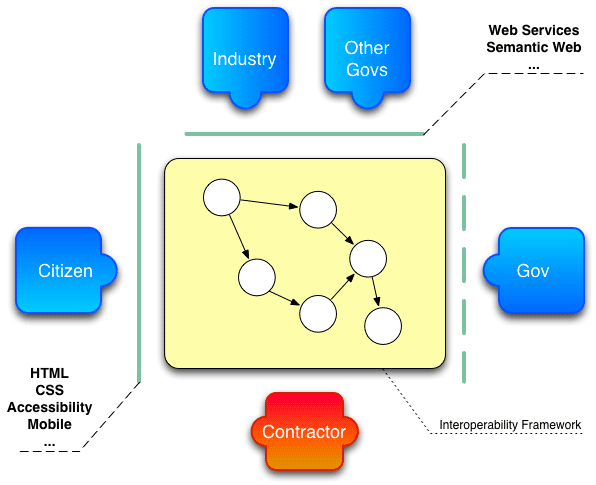
Open Standards Policies
- No-one should require people to purchase particular software for
access
- Promote longevity of information
- Openness helps to maximize reuse of knowledge
- colleagues, friends, public, companies, governments
- Open standards promote research
Open Standard Definition
A lot of debates nowadays for a common definition of Open Standards (IGF,
EC, etc.)
- Transparent process
- Open participation
- Technical Consensus and Appeal
- Running code
- Free and Persistent Specification
- W3C Patent Policy
for Web Technologies
Challenges...
- The Internet and the Web is the easy part : Web, email, forum, online
chat, IM, etc.
- Lots of non-internet technologies: telephone, fax, PDA,
SMS, MMS, Wifi, Bluetooth, RFID, biometric, smart cards, TV and radio,
etc.
- New technology-specific platforms: geolocation, foaf
blog, mashup, ads, etc.
W3C Exec Summary
The World Wide Web Consortium (W3C) is an International Consortium
where Member and External organizations, a full-time technical staff, and the
public work together to lead the World Wide Web to its full
potential by developing Web standards such as protocols and guidelines
that ensure long-term growth for the Web.
- Goals: Interoperability, Universality,
Functionalities
- Neutral/nonforprofit, consensus based, open
participation, open results
- ~350 members, ~50 staff,
- ~60 Working Groups ~20 Coordination Groups and Interest Groups
- Hosting: MIT (America), ERCIM (Europe) and Keio
University (Japan) + Offices
- Advisory Board, Technical Architecture Group
- Liaisons with 40+ other standards bodies,
Accountable to the global Public
Director: WWW (http, HTML, URL) inventor Tim Berners Lee http://www.w3.org/People/Berners-Lee/
W3C Process Flow
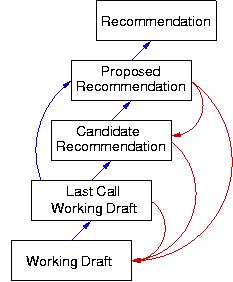
Web Standards
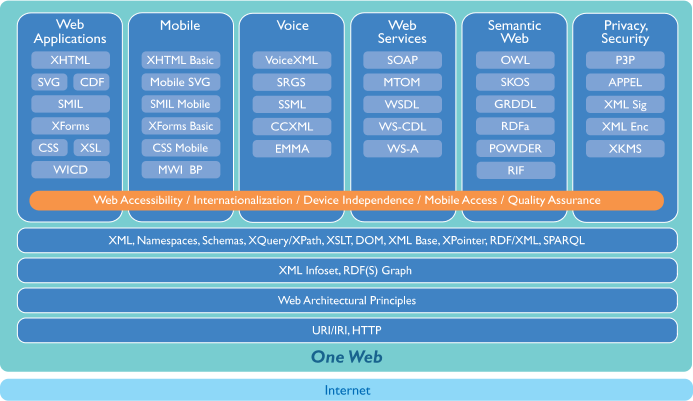
Transparency has many faces
- Accessible Web site
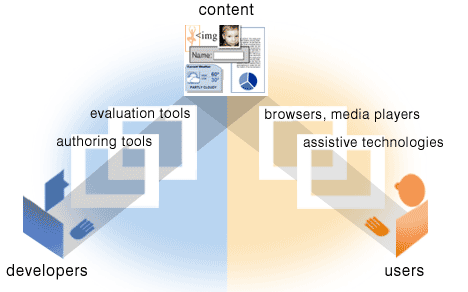
Open Data
Public data is data that is not subject to valid privacy, security or
privilege limitations (could be Your Data as well..)
- Complete: All Public data is made available online.
- Primary: Public data is as collected at the source.
- Timely: Public data is made available asap.
- Accessible: Public data is available to all.
- Machine readable: Public data allow automated processing.
- Non-discriminatory: Public data is available to anyone, no
registration.
- Non-proprietary: Public data is encoded using Open Standards.
- License-free: Public Data is available at no cost.
See original OGD
document.
Semantic Technologies
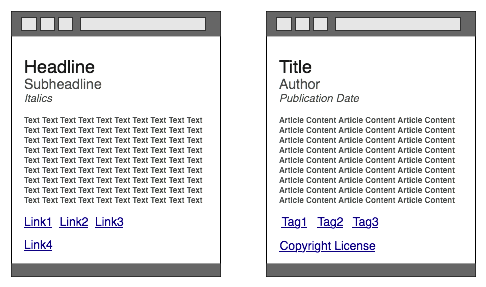
Making Standards at W3C
Inclusiveness is the rule.
W3C Eating its own dog food!
W3C works with thousands of engineers using the Web and the Internet as a
platform.
- Emails, open archives (e.g. HTML5
WG today)
- Web sites under w3.org (public, member, team)
- Web 2.0 applications (action item, issues tracker, web survey)
- Web DB tools (to manage group participants)
- Instant Message (IRC) + bots for teleconferencing
- VOIP, slides in HTML/CSS, etc.
Many using Semantic Web technologies on the server, and accessible to
participants with disabilities.
Like IETF, our process is one of our specification (bootstrap
principle)
Some simple rules - great impact
- everything is on the web, starting with a
solid process/bible,
- paperless
- history - archiving and versioning
- be your own usecase
- conform to open ICT standards + many open source tools are available
- document your communication - use mailinglists and logged chat
- be open to new applications of standards : RSS, Wiki, SemWeb, etc.
- go public - listen to the public - respond to the public, microblog
Seven Sins of Bad Meetings
- • Sin 1: People don’t take meetings seriously.
- • Sin 2: Meetings are too long.
- • Sin 3: People wander off the topic.
- • Sin 4: Nothing happens when the meeting ends.
- • Sin 5: People don’t tell the truth.
- • Sin 6: Meetings are always missing important information.
- • Sin 7: Meetings never get better.
Thanks
See those past talks with similar data. Thanks to Coralie Mercier for a review of
these slides.





